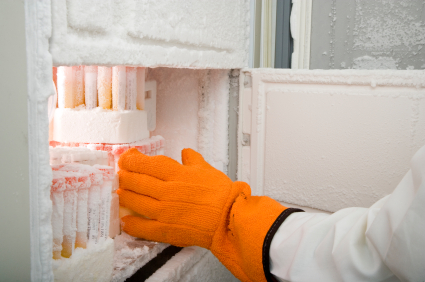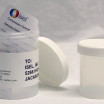
Make Sure Your Lubricant Flows When Your Cold-Temperature Operations Demand It.
If your application involves refrigeration or operates in a cold climate, the pour point of your lubricant is most likely a critical property. Pour point indicates the lowest temperature at which a lubricant is designed to flow. If the pour point is not low enough for your application and environment, your equipment will not be adequately lubricated and protected. As result, serious equipment damage or failure could occur.
Pour Point Rule Of Thumb
To ensure proper fluidity in low temperatures, the pour point of a lubricant ideally should be more than 20°F (10°C) below the application’s lowest operating temperature. By adhering to this rule of thumb, you may ensure dependable lubrication and, as a result, better equipment reliability.
The Wax Factor
Some lubricants have a tendency to form wax crystals in low temperatures. These wax crystals reduce the lubricant’s ability to flow; sometimes, they may cause it to gel. In either case, the restricted pumpability in cold temperatures prevents the lubricant from reaching its intended lubrication points in a timely manner. This may cause significant harm to equipment, especially at startup. In fact, this problem may prevent startups entirely. In addition, wax crystals may clog filters, valves, and orifices, which interfere with the system’s ability to function efficiently.
Some base stocks are wax-free, including naphthenics, alkylbenzenes, and polyol esters (POEs), among others. Certain base stocks, such as paraffinic mineral oils, contain wax. However, through the use of additives, formulations containing paraffinic base stocks can be modified to meet the low-pour-point demands of cold-temperature applications.
Other Critical Characteristics
Of course, wax content (or the lack thereof) is not the only characteristic to consider when evaluating a lubricant’s cold-temperature suitability. Other important factors include the fluid’s viscosity (resistance to flow) and temperature sensitivity (viscosity index):
- If a lubricant’s viscosity is too high, or too low, it will not have the required flow rate to provide proper lubrication and protection.
- If a lubricant is too sensitive to temperature fluctuations, its viscosity will change easily and dramatically. This will alter the lubricant’s flow rate—rendering it unsuitable for the application.
Therefore, when selecting a lubricant for cold-temperature operation, it is vital to examine all properties.
Your Ideal Solution
Isel’s refrigeration lubricants are expertly formulated to offer enhanced cold-temperature fluidity and the highest level of performance and protection. With our expertise in the chemistry of lubrication—as well as in the mechanics of refrigeration—we can proudly offer refrigeration lubricants that are unsurpassed in the industry.
Contact Isel today to learn more about our refrigeration lubricants and to identify your ideal solution.
Relevant Entries in this Category that May Interest You:
Isel is Now Part of DuBois Chemicals!
In 2020, Isel joined the DuBois Chemicals team! DuBois/Isel is proud to continue the tradition of manufacturing refrigeration solutions specializing in...
Read MoreISEL to exhibit at Best Practices Compressed Air EXPO – 2021
Visit ISEL at the Best Practices Compressed Air EXPO which is held at the Renaissance Schaumburg Convention Center Hotel in...
Read MoreMAKE-A-WISH TURNS 40 AND ISEL SHOWS THEIR SUPPORT
April 2020 On April 29, 1980, the first wish was granted. A seven-year-old boy who yearned to be a police...
Read More
